
The longer I do this, the more convinced I become that the “in the moment” story is more important than the overall story. What do I mean by that? As long as the story going on in the current scene is entertaining, you’re going to keep the reader hooked. Because if I’m entertained by the first scene and then I’m entertained by the second scene and then I’m entertained by the third scene, and so on and so forth, I’m going to want to keep turning the pages until the script is done.
However, if the individual scenes are hit or miss (I’m entertained by the first scene, I’m bored by the second scene, I’m kinda entertained by the third scene, I’m bored again by the fourth scene) it won’t matter how good the overall story is. Because the pieces within that story are struggling to keep my attention. And as anyone who’s read scripts knows, we don’t finish reading scripts like that.
This begs the question, how do you make each and every scene entertaining? Who out there has the ability to write a good scene EVERY TIME OUT? Isn’t that an impossible standard to live up to? If you’re going by the odds, some of your scenes have to be bad. Right?
Wrong.
This is a toxic way to think.
While it’s true that not every scene can be great – even scenes from some of our favorite movies suck – there’s a method you can use to ensure that your scenes will rarely, if ever, be bad. And by using this method, your likelihood of writing a good scene goes up exponentially.
The method I’m talking about is built around the idea of CONFLICT.
Now we’ve been told ad infinitum that our scenes need conflict. The problem with this advice is that that word is vague and unhelpful when you’re constructing a scene out of thin air. So I’m going to help you see conflict in a new way. And this way should help your scene-writing dramatically.
From now on, I want you to look at every scene as requiring a POSITIVE CHARGE and a NEGATIVE CHARGE. If you live by this simple rule, every scene you write is going to have conflict. Conflict, of course, naturally results in drama. And drama is the magical component that ENTERTAINS audiences.
Let’s look at the simplest version of this – positive character, negative character.
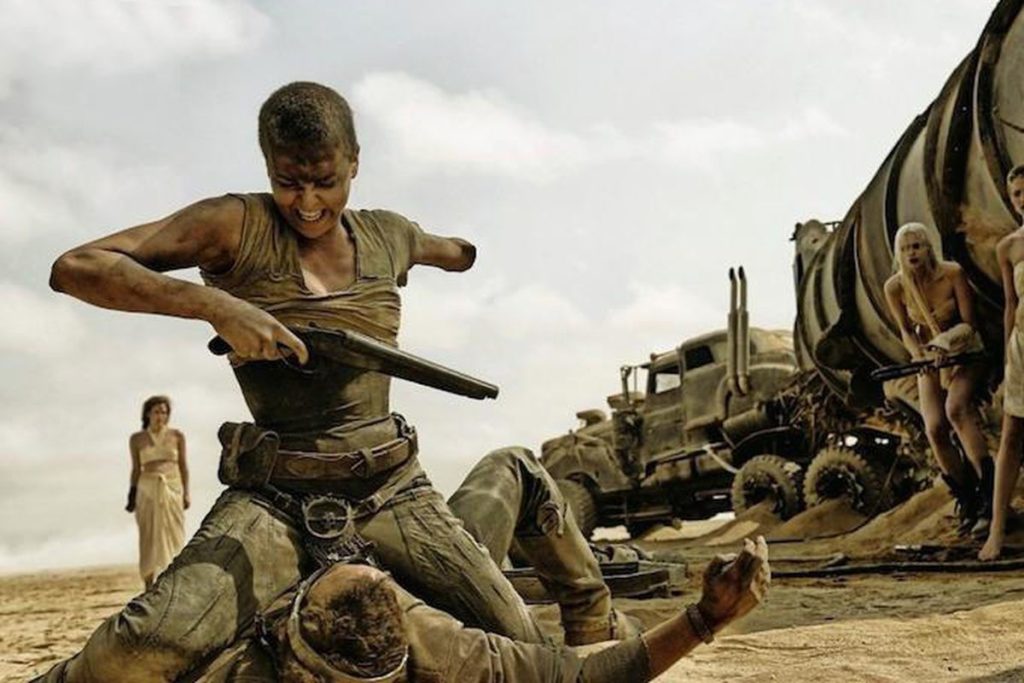
If you watch a movie like Fury Road, you have lots of scenes with your positive charge character, Furiosa – she’s trying to save a group of people – going up against your negative charge character, Mad Max – who’s trying to escape. Every scene between these two characters is entertaining because those opposing charges are always on display.
This is a great way to ensure that most of your scenes will be entertaining. You simply take the two characters who are going to be around each other the most in your movie and you assign one of them a permanent positive charge and the other a permanent negative charge. This guarantees that every scene these two are in is going to have some level of conflict, which is why the scene will probably be good.
This can work especially well if your narrative is purposefully flat. A great example of this would be the movie Sideways, which follows two friends up to Napa Valley for the weekend. It’s not a plot movie by any means. But the two friends were Jack (positive charge) and Miles (negative charge). Their essence as humans was so embedded in that positive or negative belief system that they didn’t need plot to be entertaining. They just needed to be around each other.
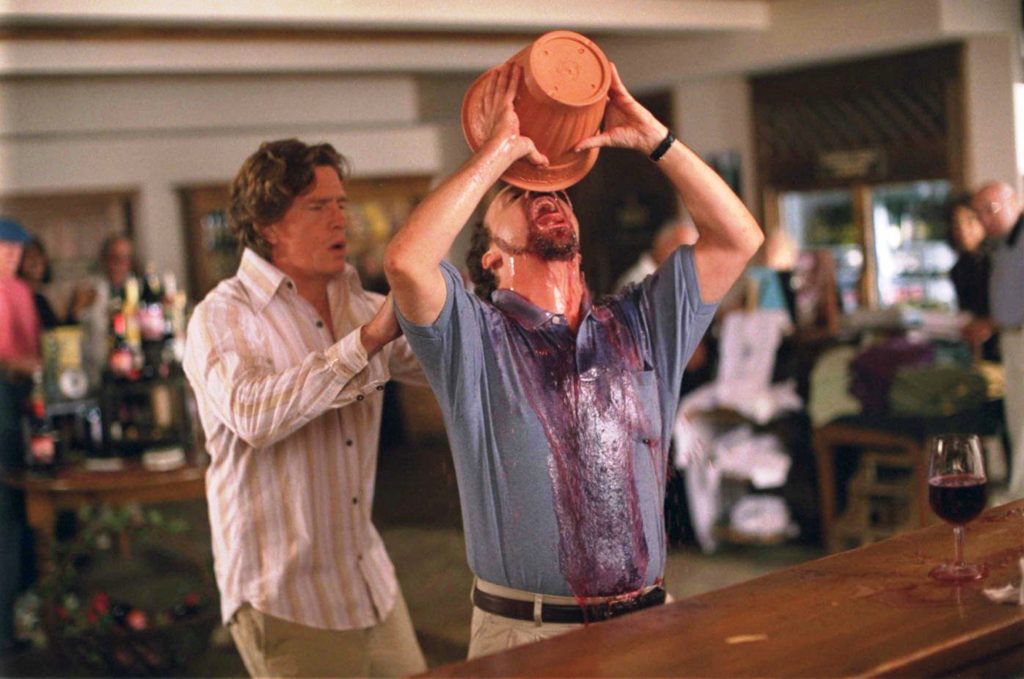
Unfortunately, not all of us are interested in writing buddy cop movies or road trip movies. Which puts you in a more difficult position. Because now instead of the positive and negative charges automatically being there for you in every scene, each scene requires you to find a new positive and negative charge.
This is where screenwriting gets tough. Because each scene becomes a unique challenge to find the charges. And if you’re lazy, you won’t bother doing so. But luckily you have me and I can give you some direction. The second type of positive-negative charge is TEMPORARY CHARGES.
In this scenario, your characters may or may not be carrying permanent positive or negative charges, which means the scene itself must be constructed in a way to give each character in the scene a positive and negative charge.
The most obvious example of this is Character A is mad at Character B about something and lets them have it. Character A is our negative charge (he’s mad!). Character B is our positive charge (he’s trying to defend himself and calm A down). To be clear, Character A may be a positive person throughout the rest of the script, but right now he’s mad, so he becomes the negative charge for the scene. That’s the thing with temporary charges. You can construct them for the moment. They don’t need to be attached to the character’s permanent identity if the scenario calls for it.
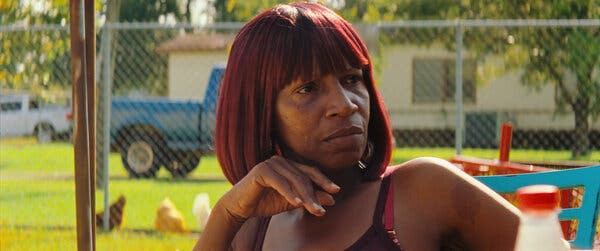
But anger isn’t the only negative charge in your Charge Arsenal. I recently watched a movie called Red Rocket. A great film. It’s going to be one of my favorite films of the year. It’s about a former porn star, Mikey, who moves back to his Texas hometown with no money. One of the early scenes has him going to Leondria, a drug dealer, to see if he can sell weed for her.
This is a very simple example of a temporary positive charge temporary negative charge scene. Mikey is the positive charge. He’s trying to get something to better his life – make money so he can move back to Los Angeles. And Leondria is the negative charge. She’s suspicious of Mikey. She’s also potentially dangerous. She doesn’t really want him selling for her. That’s what makes the scene entertaining, is the positive charge being forced to interact with the negative charge.
And by the way, if you want to see a masterclass in positive-negative charges, go watch Fargo (the film). The reason almost every scene in that movie is a classic is because that’s all the Coens focused on back then, was positive and negative charges.
Okay, let’s get a little more nuanced now. Let’s say that you have two characters who get along. Which means, in the majority of their scenes together, they’re both going to be positive charges. This will usually happen when two characters fall in love. So now what? How do we create conflict if two people are on the same page?
Simple. We introduce a negative charge EXTERNALLY. Romeo and Juliet is the perfect example of this. Romeo and Juliet are both positive charges. But their families are both negative charges. Which means you just have to bring a family member (negative charge) into a scene to create conflict. Or, in some cases, just the threat of Romeo and Juliet being caught out with each other can be a negative charge. Think about it. These two aren’t hanging out without a care in the world. They’re hanging out always having to look over their shoulders. Why? Because behind their shoulders is that looming negative charge.
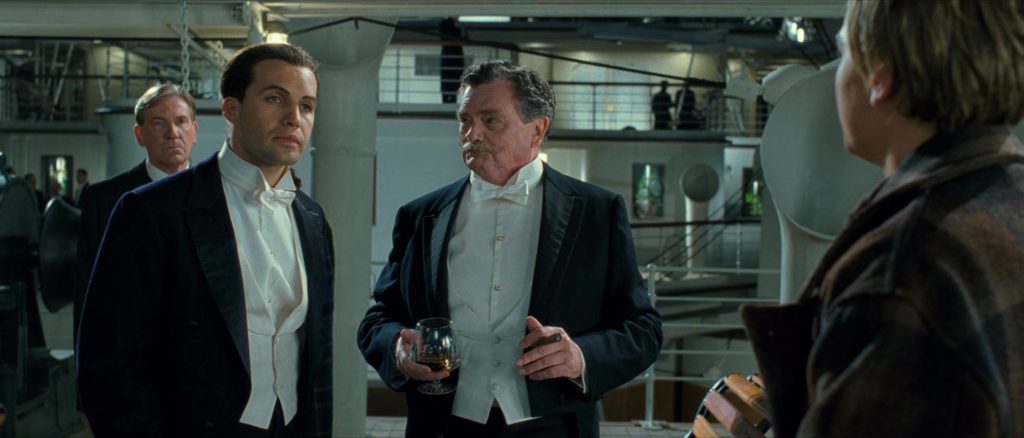
This is what James Cameron did with Titanic as well. At first, Jack and Rose were opposing charges. He was positive (trying to get her) and she was negative (she was resisting). But once they got together, they both became positive. And that meant Cameron had to create a series of external negative charges to keep their scenes entertaining. He did this with Cal Hockley, Rose’s fiancé. He did this with Hockley’s undertaker assistant, who chased them around. And he eventually did it with the ship itself – the sinking and all the problems it created were the primary negative charge in many of their scenes.
Now here’s a question for you. What if you only have one character in a scene and he’s not in a scenario where he’s opposite a negative charge? How do you create the necessary conflict to ensure an entertaining experience for the viewer? This is where writing gets fun. You create the charge FROM WITHIN. One charge will be the external and the other charge will be the internal.
So let’s take a look at Arthur Fleck, the Joker. The reason that Arthur looking in a mirror can be a compelling scene all on its own is because externally he’s struggling to be happy (negative charge). Yet internally, he’s desperate to be happy (positive charge). Which is why he’s shoving his fingers into the sides of his mouth and forcing them up. He wants to smile but he can’t.

If the Joker were to smile and there was no resistance at all, there’d be no conflict. So the scene wouldn’t be dramatic. Hence, the importance of opposing charges.
All of this boils down to when you’re in a scene, ask yourself, where is the positive charge coming from and where is the negative charge coming from? If you have that in place, there’s a good chance you’ll write an entertaining scene. The reason I say “good chance” and not “guaranteed” is because screenwriting is composed of too many variables that affect each scene.
Take a look at the Obi-Wan Kenobi show. Many of the scenes in the second episode followed the rules I laid out above. They have Obi-Wan in them, our positive charge (he’s rescuing Baby Leia), and Baby Leia, who represents our negative charge (she resists his help and is not thankful). These scenes should work according to me. Both characters have an inherent opposing charge. Why, then, do the scenes suck? They suck because Baby Leia is a poorly written character. We don’t like her. We don’t want to be around her. Even the most well-constructed version of conflict in a scene will fail if we don’t like (or are interested in, or care about) one of the characters in the scene.
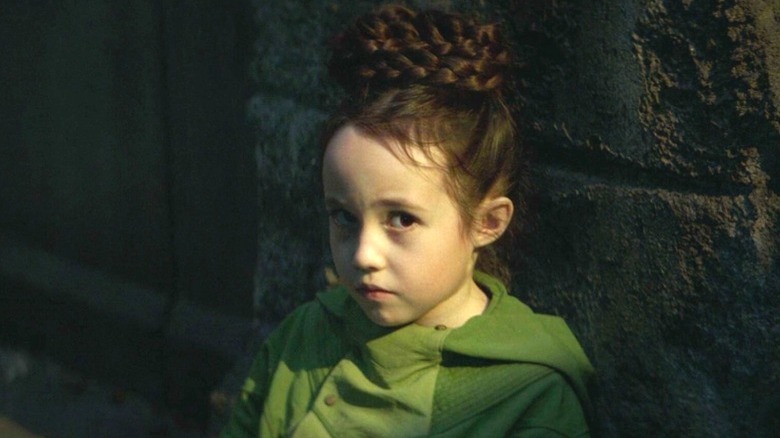
So obviously, other parts of your screenplay need to be on point. But at least now you know that if you inject that positive and negative charge into every scene, there’s a good chance you’ll write a dramatic scene. And since drama equates to entertainment, we’re going to be invested in each and every one of your scenes. Go forth and try this in your current script and watch how much better your scenes get.
Genre: Action/Comedy
Premise: The adoptive daughter of a legendary assassin returns home for his funeral… and finds herself in the crosshairs of her four highly trained, highly dangerous siblings.
About: This script has one of the flashier loglines on the Black List. The writer, Ryan Hooper, is just starting his career. The project is set up at Thunder Road, the production company responsible for John Wick, which implies this could be another project they’re looking to integrate into the John Wick universe.
Writer: Ryan Hooper
Details: 104 pages
 Based on the main character’s name, I’m guessing it was written for Kravitz.
Based on the main character’s name, I’m guessing it was written for Kravitz.
First off, good title.
Titles are always tricky and one way to stand out is to do a riff on a previous well-known title. Four Weddings and a Funeral is a well-known movie with one of the better titles in history. Take note that when you are riffing on other titles, it tends to work best when your movie is a comedy.
As for the concept itself, I think it’s pretty sexy. It’s a mix between Knives Out and Ready or Not. I could see a lot of executives flipping for that kind of pitch in the room.
But there is something about the idea that worries me. I’ll share that after the plot summary and let you know if the writer was able to overcome this issue.
Joel Ferrier is a legendary assassin who is part of a board of assassins who perform high level hit jobs around the globe. So it should be no surprise that he trains his four children to be hit men as well. There’s the oldest, image-is-everything Todd, then feisty Violet, then loving Dominic, then snazzy Portia.
And finally, there’s the mixed race youngest of the clan, Zoe. Zoe is adopted and, therefore, not treated equally by her brothers and sisters. In fact, they barely pay attention to her at all. So when they grow up and get a call that their dad died in Vegas of a heart attack, they’re actually kind of surprised to see Zoe show up for the funeral.
But what really surprises them is when the lawyer reads the will. All the money goes to Zoe’s mother. And since Zoe’s mother is dead, all the money goes to Zoe. Violet becomes enraged and decides right then and there, she’s going to kill Zoe. She lets the others know you’re either with me or against me. They decide they’re with her.
Zoe runs for her life and starts hiding around her family’s giant estate, eventually getting her hands on a jump drive. Zoe becomes convince that there’s more to this story of her father’s death and tries to find her way to a computer where she can look at what’s on that drive before Violet kills her.
She eventually finds out that her father, along with two other board members, were murdered by a stealth group of assassins led by Violet, who disguised the killings as suicides. Which means, of course, that Violet can’t allow Zoe to escape the estate. If she does, the other board members will know what she’s done, and kill her before she can complete her takeover. Can Zoe escape four of the most highly trained assassins in the world? I guess we’ll find out!
Today I want to talk about how some loglines can sound really good as loglines yet be really tricky to turn into screenplays. And Four Assassins is that kind of screenplay.
I love this logline. It’s fun. Kind of like a higher-stakes version of Knives Out.
But think about sitting down to expand this idea. For starters, you have to convincingly come up with a scenario where four siblings want to kill a fifth sibling. Since siblings don’t tend to want to kill each other, most of the motivations you come up with are going to feel forced.
Hooper began solving this issue right away by making Zoe adopted. She was never really a member of the family. But how do we go from that to: the four people you grew up with want to kill you?
It’s a huge leap and one that will determine the amount of buy-in necessary for the audience to suspend disbelief.
What Hooper ended up doing is making Violet the only true sibling who wants to kill Zoe (because Zoe has info about what she did to their father). For this reason, I can buy into Violet’s motivation. Her life is on the line if she doesn’t kill Zoe. But I’m not sure I ever bought into why the rest of the siblings agreed to kill Zoe.
They don’t have anything to protect. So, therefore, the only reason they’re going after Zoe is because the script needs them to, because the logline says that’s what happens. Which is a dangerous game to play as a screenwriter. You want your motivations to be strong for every character involved.
However, if you can get past that, it’s a solid script.
I liked that Zoe had her own goal. Because that made her active. I recently did a consultation that was set up in a similar fashion. The main character was bouncing around, running from the bad guys. But because she never had a goal of her own, she came off as reactive the whole time. The antagonist was the one driving the story. And while it’s not impossible to build narratives around the antagonist driving the narrative, you have to note that whenever you do so, your hero will suffer a bit. Cause ACTIVENESS is often a character’s most defining trait. Therefore stripping your hero of that makes them less defined.
By giving Zoe this mystery to solve: What’s on this jump drive? And, on a deeper level, who was her mom and how was she associated with Joel? It gave her more to do than just run away. She becomes an ACTIVE character.
So if there’s any big takeaway from this script, that would be it. If you’re writing a movie where your hero gets chased, add a storyline where they, themselves, are chasing something. My favorite movie ever, Star Wars, applies this device. Luke and Obi-Wan aren’t just running away from a pursuing Vader. They’re trying to deliver the Death Star plans to the leaders of the Rebellion.
Four Assassins is one of those scripts that you nod your head after and say, “Not bad.” The craft is strong. The concept is fun. You can see the poster. But the story didn’t feel like the writer took enough chances. There was a safety net feel to everything that kept the script from becoming memorable. Scripts need to take at least one giant risk to be memorable. That never happened here. With that said, I think the movie would make for a cool trailer. And if a director elevated it not unlike the way Stahelski and Leitch elevated the John Wick script, who knows?
[ ] What the hell did I just read?
[x] wasn’t for me
[ ] worth the read
[ ] impressive
[ ] genius
What I learned: Be careful about using jokes that could’ve been used 20 years ago. Hell, be careful about using jokes that could’ve been used 3 years ago. Cause dated jokes put you in one of two categories. You’re either a) out of touch. Or b) giving us a dated screenplay. When an assassin with long blond hair attacks Todd late in the script, he screams the line, “F#%k you, Fabio! Get off me.” This is the definition of a joke that could’ve been used 20 years ago. With a little effort, you can come up with a more timely reference.
What I learned 2: Give your characters names that sound like their most dominant quality. You have your main antagonist here, who is the most VIOLENT of the assassin family. So what name does Hopper give her? “VIOLET.” Han Solo does his own thing. He operates independent of everyone else. Which is why his name is Han SOLO.
Is this JJ Abram’s big return to prominence? Or is it a five car pile-up waiting to happen?
Genre: Sci-Fi
Premise: After losing his older brother in a fatal racing wreck, a just out of high school Speed Racer attempts to pick up where his bro left off.
About: As Mr. Crawford informed me, this 1994 draft was intended to be directed by Julien Temple, with a pre-Amber Heard Johnny Depp starring. It was deemed too expensive to produce. Alfonso Cuaron was attached to direct in 1997 but that didn’t work either. The Wachowskis would develop a different script and shoot that back in 2005. The movie did not do well and Speed Racer was quickly forgotten. But JJ never let go of his love for the property and has decided almost 30 years later to turn it into a TV show for Apple. What’s his vision for that show? I assume it’s something akin to his feature treatment, which we’re going to look at today.
Writer: JJ Abrams
Details: 126 pages

I am so torn by what I’m about to experience.
I love JJ.
I hate anime.
JJ. Anime. Anime. JJ.
Even as a kid, when you have zero storytelling discernment – if it’s flashing colors, you’re happy – even as a KID I watched this show and thought it was nonsensical. You can’t turn something nonsensical into a movie and expect good things. You need a base. You need a story. To this day, Speed Racer will be known as the movie that officially slammed the coffin shut on the Wachowskis being considered serious filmmakers.
Is JJ about to make that same mistake? Or has he cracked the code for making live-action anime actually good?
The year is the 50s. We watch as a young man named Rex Racer is racing in a high-stakes race where the tracks are long and weird and have jumps over mountains and stuff. During a particularly difficult section of the track, Rex crashes and DIES! The entire Racer family, including his younger brother Speed, are devastated.
Cut to 12 years later and Speed is now 18. All he wants to do is race but his family is still so devastated by Rex’s death that they don’t even talk about racing. Speed graduates high school and watches, longingly, as his crush, Trixie, heads to London to enter into helicopter school.
Speed finally gets the courage to ask his father if he can race because racing is in his blood and his father shocks him when he takes him to a remote garage and introduces him to the car he’s been building over the last decade. The Mach 5!!! Speed is so excited that he wants to race this weekend. But you haven’t even practiced, his father says. Speed proves that he can handle professional racing by easily beating the lap record at the local speedway.
Just as he’s about to race, he’s cornered by the mysterious Racer-X, who always wears a tinted visor. Racer-X says to him, “Don’t race,” in a very sinister manner. But Speed doesn’t listen, races, and finishes second to Racer-X, which turns him into an overnight superstar, due in no small part to being the younger brother of the deceased Rex.
The next race is a big one and it’s in England! Which means, guess what? He’s going to see Trixie! Except now that he’s a big popular racer, all the women want him, including the seductive Tatiana, who puts all her cards on the table and says she wants to “get naked” with him ASAP.
During the race, Speed realizes that the big time is a lot bigger than he thought. The race is way tougher. And during it, out of nowhere, a giant tree lands in the middle of the speedway and Speed crashes and his car catches fire. To everyone’s shock, Racer-X slams to a stop and runs over to save Speed (BIG SPOILER). When he lifts his helmet momentarily, it’s revealed that Racer-X is actually…. REX! His brother!
But how can this be!?? Later that night, Rex secretly informs Speed that there are higher powers fixing these races, which is why he tried to warn him off them. If you don’t play by the rules, they make you disappear. Is Speed going to give up? Or is he going to keep racing? Something tells me you can’t keep Speedy in the corner. And that both him and his brother are going to rule the racing world together!
Word on the street is that the development process for this project has been agonizingly slow. And I can see why. There are certain tones that have virtually no wiggle room. When you have, say, a romantic comedy, you can develop something that’s goofy, like The Lost City, or romantic, like Love Actually.
But with this… you need to nail a very specific type of humor along with porting what was meant to be animation into live-action, which is a whole other ball of wax that requires an adjustment so sensitive, it’s like trying to land a 747 on a runway the width of a balance beam.
Look no further than Cowboy Bebop to see how quickly things can go south.
With that said, JJ wins again.
This isn’t a great script. But what JJ is really good at, at least as a screenwriter, is telling a simple story well. Which is the foundation of screenwriting. You’re not trying to tell a complex story well. But a simple story. Which is what this is. It’s a kid whose brother died racing but he still wants to be a racer. And that’s it. He races and the races are all fun because they have a bunch of fun wacky car setups.
However, I understand that saying, “He tells a story well” is a vague statement that helps no one. So let me give you an example of what I mean. At the beginning of the second act, Speed reveals to his father that he dreams of being a race car driver, like his brother. So his father gives him his first racing car. Speed then says, “I want to race in the big race this weekend.”
Now most screenwriters would’ve just cut to the race. That’s what this movie is about right? A guy who’s a racer. Let’s put him in races! But the smart screenwriter understands that it doesn’t make a lot of sense for someone to race when they’ve never even practiced before. In these scenarios, YOU MUST MAKE YOUR HERO EARN IT.
So Speed says to his dad, if I can beat the lap record at the local speedway, can I race? And his dad says sure because, “that’s impossible.” Of course, Speed Racer does the impossible and sets the record. This is standard good storytelling. You can’t hand your hero anything. Make them earn it. Especially if they’re making a big leap in the script.
I also liked the big twist (SPOILERS FOLLOW). I’m not familiar with the Speed Racer show so I don’t know if this was JJ’s idea or not. But I loved that Racer-X turned out to be the dead brother. That moment jolted me out of an appreciate reading malaise and turned the script into something I actually wanted to finish.
Because now I could tell the writer actually cared. They thought about the story. Most writers will just kill off the brother in that opening scene to create sympathy. They don’t think beyond: I NEED TO MAKE MY HERO SYMPATHETIC. To bring that storyline back in a powerful way conveys a way higher desire to tell an enjoyable story.
I think I have a better idea of Speed Racer after this script. I always thought of it is as random weird anime. But now I realize it’s like the car version of Inspector Gadget. The cars can do all these fun things and there’s this deeper sci-fi spy story involved. It’s still going to be a hell of a tightrope to walk tone-wise. But if JJ is heavily involved and doesn’t leave it to one of these dime-a-dozen showrunners, I think it might actually be good. And that’s something I was not expecting to say going into this review.
Screenplay Link: Speed Racer
[ ] What the hell did I just read?
[ ] wasn’t for me
[x] worth the read
[ ] impressive
[ ] genius
What I learned: The correction of “who” to “whom” is used in a dialogue scene in Speed Racer. You know what? Never use the word “whom.” Between the years 1993 and 1999, everybody was obsessed with the difference between the word “who” and “whom.” It became such an obsession that it began appearing in numerous movie dialogues, including films as big as The Phantom Menace. To this day, these silly debates have rattled, mobilized, and confused people to feel passionately about this debate yet I am here to tell you that “whom” is a stupid word that nobody who isn’t trying to sound pretentious uses and you can literally use “who” in its place every time and no one will care. I’m glad we can all agree on this.
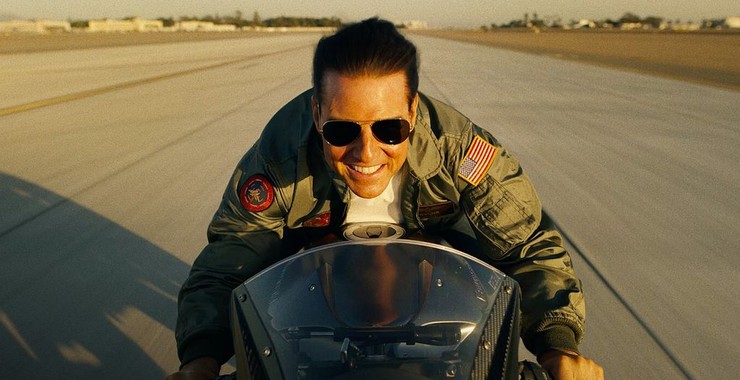
I was going to review Stranger Things Season 4 today but there’s only one problem. I’m still on episode 6 of season 3. I had a brief flurry of motivation to binge the rest of the episodes up to and including season 4, but binging is so 2011. We’ve evolved past that, have we not? I’ll try to watch it all by next week assuming I don’t get consumed by a demigorgan.
Why am I still stuck on season 3, you may ask?
It’s complicated. I’m reluctant to say this because she’s so beloved but I’m kind of creeped out by Millie Bobby Brown. She’s like a 40 year old in an 18 year old’s body, playing a 15 year old. In fact, all the kids are looking a lot older than their TV ages. And this is in Season 3! I can only imagine how they look in Season 4.
You run into this problem when your storyline is continuous from season to season. The kids start turning into gigantic adolescent monsters despite only several days of movie time passing, lol. I full expect that in season 5, Finn Wolfhard will have graying temples and complain of seasonal arthritis.
Check out the stories of Patrick Fugit on the set of Almost Famous. Two weeks would go by and he’d grow 4 inches. So in the first half of a scene he’d be shorter than Kate Hudson, and in the second half he’d be taller.
It was interesting to see where I gave up on Season 3 of Stranger Things, since Netflix remembers exactly where you tuned out. It turned out to be the sequence where that annoying-as-sh%t girl who can’t act kept blabbering on to Gaten Matarazzo. She was it for me. I was like, “I can’t take this anymore. This show is made for 10 year olds.” That bad taste in my mouth prevented me from ever going back.

But when I started it up again, I realized that I like a lot of the actors here, despite Millie-Bobby Brown being 3 years away from receiving social security benefits. I love Gaten. I love Joe Keery, Sadie Sink, David Harbour, Maya Hawke. And the production value is astounding. There was a scene in a supermarket and I noticed that every single cereal box – of which there were 50 different brands – were all 1980s authentic.
The average person doesn’t think about that. But I think about it. It takes a lot of work to pull that off. I heard that Stranger Things currently has the highest budget per episode of any show. I believe it.
Something a lot of people are wondering is, can Stranger Things save Netflix? Season 4 doubled Bridgerton 2’s debut, which was the previous ratings record-holder. It occupies the only IP slot for the streamer that holds ongoing value – that drama/sci-fi genre spritz that geeks become obsessed with.
The reason this matters is because it’s the one area Netflix can’t compete with the studios on since there are puppies who have been around longer than the streamer. If Netflix goes the way of Blockbuster, a lack of IP will be the primary reason. So Stranger Things is valuable to them in that sense. However, it’s not a clear path forward for future stories. The main reason people watch it is because of the chemistry of these kids. As I’ve fastidiously pointed out, they’re not going to be kids for long. And then what?
Netflix’s only other IP plan seems to be to make Knives Out a franchise. Oh Netflix. Oh my poor Netflix. Never ever bet on Rian Johnson. The force will not be with you. But in all seriousness, who tries to make a franchise out of a very specific whodunnit? That’s not going to end well.
Meanwhile, you’ve got Top Gun 2 taking over the world. Some are calling it ‘the perfect movie’ and I know what they mean. They don’t mean it doesn’t have flaws. It means when you imagine going to the movies and having a great experience, Top Gun 2 fits that slot to a T. It’s action-packed. It’s fun. It’s got a movie star everybody loves. It leaves you with an excitement to go out and experience life. It’s the perfect entertainment experience.

And I know Hollywood loves to get excited about bombs. The sharks get so giddy whenever a highly hyped movie doesn’t perform well. But on the other side of that is how excited they get when they’ve got a hit. The town is so happy. Everybody’s celebrating. Everybody not named Netflix feels good about the possibilities of movies again.
And everyone eats. Joseph Kosinski is now going to become the most desired director in town. Miles Teller’s career has been revived. Tom Cruise is going to be re-courted by the super-franchises, like Marvel, DC, and Fast and Furious.
However, why would Cruise join those franchises when he could just start his own? Yes, Top Gun is about to become a franchise. Should Top Gun become a franchise? Of course not. It’s not built to be one. It’s about jet flying school. What’s the next movie going to be about – parachuting practice?
But the thing is, Top Gun is performing like a mega-franchise film. It’s going to top 1 billion dollars. For those wondering what that means, the last freaking Star Wars movie made 1 billion dollars. You don’t make that kind of money as a producer then waltz off in search of the next Paul Rudd dramedy (no offense to Paul Rudd).
The problem with a sequel to this sequel is that it would barf all over the good will this film garnered. Part of the allure of the film was not seeing Tom Cruise in this role for 30 years. Why then, would we get excited about not seeing him in this role after 2 years?
They could definitely move the starring role over to Miles Teller. I have no doubt in my mind that he would sign for three 20-dollar gift certificates to In and Out. The man was picked to be the next big movie star before making some of the worst career choices in Hollywood history and becoming an afterthought. Then this comes out of nowhere – you bet your a$$ he’d say yes to a sequel.
And you do already have the first sequel storyline ready to go. They want to close down the school for good and focus on unmanned fighters. Rooster has to prove it’s worth keeping manned fighters in service. He goes up against a group of remote desk jockeys piloting their smaller sleeker drone-jets from the safety of a remote facility in New Mexico before taking on Russian drones in a Siberian mission. The story writes itself.
And I suppose there’s no rule that says you have to stay in Top Gun school. So maybe we follow Teller (or other pilots) out on real missions. We’ve definitely got a clear enemy to fight in Russia. So you could have some fun there.
But the franchise would have some uphill battles. Because of Cruise’s star power, none of the other pilots really got a chance to shine. Even Rooster was in the background for most of the film’s first half. So they’d have to build up those pilots and make them worthy of carrying a movie.
But make no bones about it, this is now a franchise. There are going to be many Top Gun films going forward. And I would argue that they should go forward without Cruise. Because the irony is, Cruise’s star power holds everyone else back, which limits the direction the franchise can take. If they want to expand this thing out, we need to see the other characters shine.
And I just don’t see a storyline for Maverick. His storyline in this one was perfect. He was gone for 30 years. He comes back to teach the class. You don’t have that if you pick things up after 2 years. I don’t know. It’ll be interesting to see what Bruckheimer chooses to do. They’ll of course offer Cruise a bajillion dollars because they have to. But they may be better off if he turns them down.
Before I sign out, I have one last thing to share. I saw Ti West’s “X,” the homage to 70s horror flicks about a group of people who head out to a remote cabin to shoot a porno film. The film received a shockingly high 97% on Rotten Tomatoes, which is notorious for hating on horror films. So I figured I was in for something good.
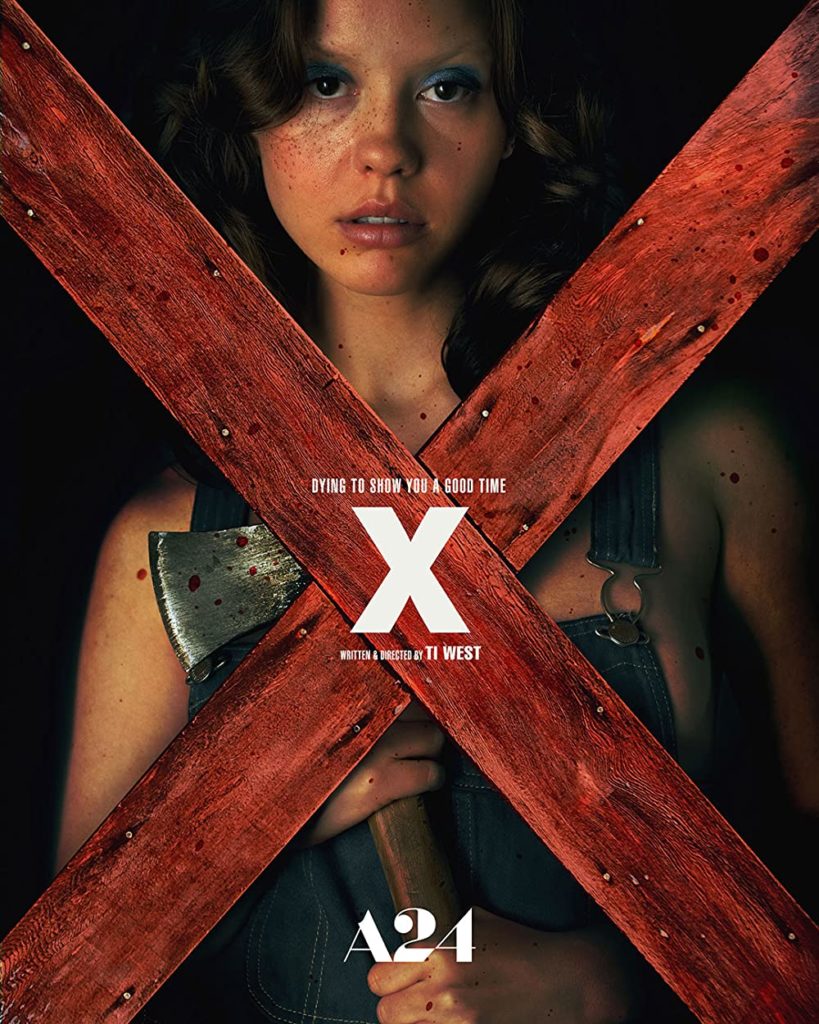
Maybe my expectations were too high but the movie was just too darn silly. It’s about this old couple next door who slaughters our filmmakers. I’m not going to say it’s impossible for two hobbling 85 year-olds to slaughter 5 people between the ages of 20-40. But talk about some suspension of disbelief. At one point, the old man has to stop in the middle of a field to catch his breath from walking uninterrupted for 3 minutes. But killing people? Sure, that takes no effort at all.
The film does try to explore deeper themes about getting older and the loss of one’s sexuality and the effects it has on our psyche. And while it was noble and, at certain points, creepy (the old woman really wants to have sex with someone – anyone), the best scene in the movie was a crocodile chasing one of the porn actresses, which is a scene that could’ve been in any horror movie. The best moments of your movie should be specific to your concept. They shouldn’t be moments that could be in other films.
So it was a [x] wasn’t for me, unfortunately. But I’m not going to hate on you if you liked it. :)
Jurassic World or Stranger Things 4 review next Monday!
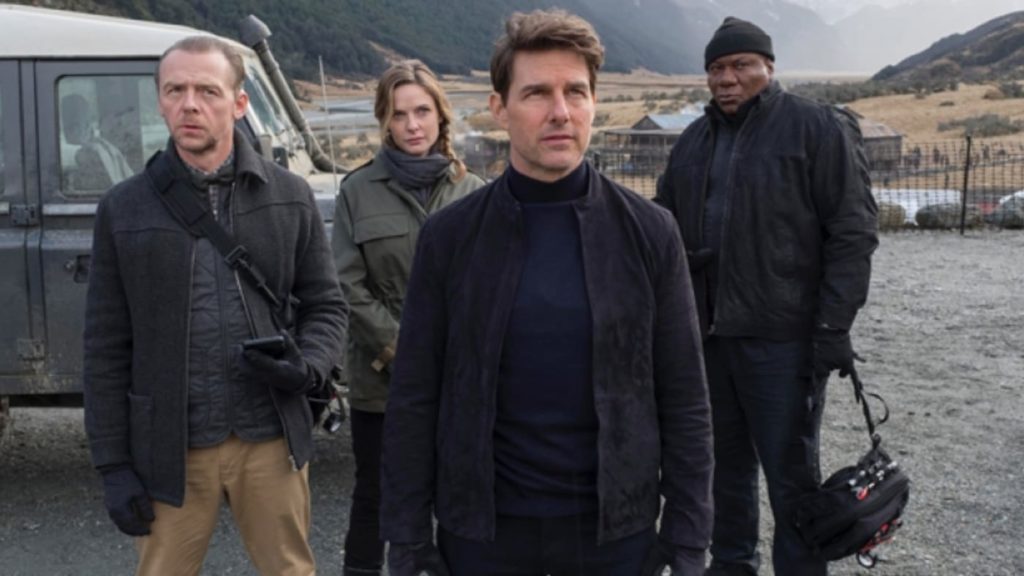 This mission is much easier than you’ve been led to believe.
This mission is much easier than you’ve been led to believe.
We spend an awful lot of time on this site, and in the screenwriting community in general, discussing how difficult screenwriting is. And while it’s important to educate ourselves on the challenges of the craft, you don’t want to get too caught up in the roadblocks preventing us from writing a great screenplay. Us humans are notorious for using the negative aspects of our pursuits to justify not pursuing them.
It’s easy to say, “Well only 1 in a million scripts ever gets made so what’s the point?” And if you take a statement like that at face value, then sure, screenwriting does suck. But that statistic includes the 900,000 screenwriters a year who’ve only ever written one screenplay. The people who read this site are way ahead of anybody who’s only written one screenplay, trust me.
And to be honest, I don’t think there are nearly as many screenplays out there as people think there are. The biggest screenplay contest in the world gets 7000 entries (the Nicholl). And a good portion of those are from writers who entered two scripts. I’m just not convinced that there are that many screenplays to compete with. At least not many scripts from writers who actually put blood, sweat, and tears into the pursuit.
Which is the theme of today’s post.
Screenwriting is easy.
Or, at least, easier than you think.
The perception of any pursuit is influenced by the lens you choose to see it through. Therefore, it is in your best interest to frame things positively rather than negatively. For example, you can say, “It’s impossible to get anybody of influence to read my script.” Or you can say, “It’s 100 times easier to get people of influence to read my script today than it was 20 years ago.”
I remember I actually had to COLD CALL agents to try and convince them to read my script. Think about that for a second. And they didn’t even have managers back then. So you only had half the influential people on the representation side to help. Now you have agents AND managers. You can find most of their e-mails on imdb pro. And you can cold e-mail them with way more efficient and successful results. Don’t even get me started on the perils and expenses of printing hard copies of screenplays and then physically sending them to agencies. You guys should thank your lucky stars that you don’t have to deal with that never-ending sh#tshow.
Also, how many freaking TV shows come out a year? 1000? Back when I was coming up it was like 50. All these shows need writers. You are a writer. The opportunities are so much bigger today than they used to be.
As far as writing screenplays, you can see it as an endless list of beat sheets and writing tools you have to use and writing pitfalls you have to avoid and save the cat scenes and midpoint twists and dramatic irony and dialogue with subtext and, oh my god, make sure your voice is strong… whatever that means.
Or you can see it for what it actually is.
Which is telling a story.
That crazy thing that happened to you that one night in college? That story you love to tell when you’re around a bunch of friends sharing their own crazy stories? That’s all a screenplay is. It’s that. There’s a main character (in this case, you). Something happens to throw him into disarray. He now has to achieve something. A bunch of obstacles are thrown in the way. And then he somehow, against all odds, succeeds in the end.
Treat your script like that. Like you’re telling a real-life story. Then spread out the most exciting moments so that they’re evenly spaced over 100 pages. Then make sure your hero is actively pushing towards his goal in between those exciting moments. No need to overcomplicate it.
By the way, screenwriting is the least demanding art there is. You don’t need to buy anything. You don’t need extra people around. You’re not limited to doing it at a certain time of the day. You can write whenever. I am recalling, in this moment, that Scriptshadow writer who wrote a script ON HIS PHONE while riding the train every day to work.
In all honesty, it felt like a script that had been written on a phone. But the point is, you can write anywhere at any time.
Consider what a director has to do. He has to rent all this expensive equipment and find people to help him. And if he wants to shoot anywhere other than his apartment, he has to get filming permits. And if he wants to do anything even remotely cool, like pull focus, he has to hire an additional person and laboriously prep the shot.
You just have to type FADE IN and then whatever comes to mind.
Oh, and by the way, 90% of the screenwriting page is white. Talk about a forgiving medium. You don’t have to come up with these long thoughtful interesting inner monologues from your main character like novelists do. You just tell us what happens. And, when you’re not telling us what happens, you write dialogue – which, oh yeah, takes you all of three minutes per page when you’re on a roll. If that isn’t easy, I don’t know what is.
I write 1500 words a day here on Scriptshadow. At that rate, I could finish a script in 15 days. 15 DAYS! That could be you. Just match my output here on Scriptshadow and you’re celebrating a new script in less than a month.
But wait. Is writing a script really that easy?
Yeah, it kinda is.
- Spend a week coming up with concepts, pick the best one.
- Center your story around a character with a flaw that’s holding him back in life.
- Come up with 2-5 other characters in your hero’s life he has some unresolved issues with, usually his family.
- Introduce a giant problem in your hero’s life.
- This forces them to pursue a goal.
- Come up with a series of obstacles, both big and small, that get in the way of your hero’s goal.
- Have your hero struggle against his flaw as well as with the people in his life, who he can’t fully connect with until he overcomes his flaw.
- Introduce a few unexpected plot beats that both surprise the audience and add excitement to your story.
- Have your hero seemingly fail, maybe even give up.
- Have them regroup and, in your climax, go up against the antagonist to achieve the goal, at which point they will win or lose, and also finally overcome their flaw.
Doesn’t sound too difficult to me.
Once the script is finished, a lot of writers think, “What do I do now?” So I’ll remind you. You have more avenues to get recognized now that at any other point in history. You have no idea how much a screenwriter felt like an outsider before the Internet. Talk about a true helpless feeling. Back then, the only advice anyone could give to you was, find someone who’s in the industry and get them to read your script.
A lot of good that strategy’s going to do if you live in Germany.
These days, getting repped or getting optioned isn’t hard work. It’s just busy work.
It’s going through all the contests you’re considering entering and picking the ones that are right for your script. It’s going to IMDB Pro and getting e-mail addresses for all the agents and managers and production companies your script seems right for and writing up a simple but compelling e-mail query that highlights your irresistible logline (I consult on e-mail queries for $50 if you want outside help- carsonreeves1@gmail.com).
And then it’s sending your script out to the people who request it. After that, you’ve done all you can for that script. You can be proud of yourself and even if you only get no’s, chances are you’re going to gain a few fans who tell you to send any future scripts into them as well.
If you’re still on one of your first three scripts, you might not get any love yet. That’s okay. Keep at it. You just need to figure out a few of the idiosyncrasies of screenwriting and you’ll be well on your way soon.
The process of screenwriting and getting an agent and getting on the Black List and selling your script and getting your script made – they all seem impossible when you look at them through a macro lens. It feels like there are too opportunities for something bad to happen. Instead of that, just focus on the step in front of you.
That might mean coming up with an interesting main character. Or deciding which contests to send your script to. When you do that, things will feel much easier.
There’s way too much negativity out there. It’s like an evil fog that seduces you. It can provide you with a warm feeling to believe that nothing you do matters and it’s all luck.
I’m all for the occasional pity party. It can be an emotional catharsis that’s required to get back on the horse. But, overall, you should be thinking positively. It’s all in how you frame it. Think about how easy screenwriting is compared to other arts. How much easier it is to write professionally today than it was 20 years ago.
By focusing on the good, you’ll be more driven to write. You’ll feel more like your writing matters. And you’ll be more positive when you pitch people, which in turn will make them more interested in you.
So keep writing everyone. It’s actually quite easy.

